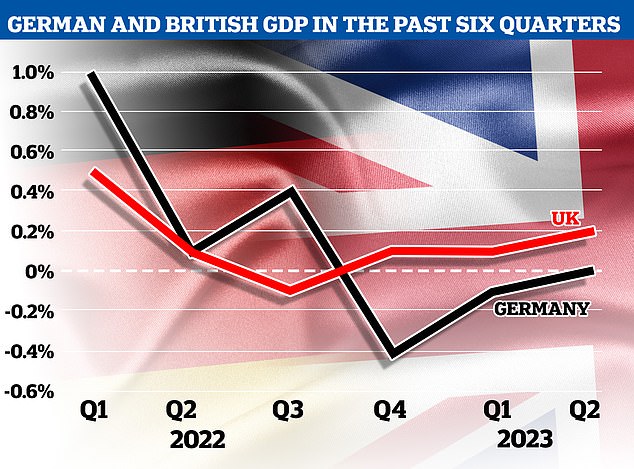More bad news for the sick man of Europe: Germany’s production falls for third straight month as fears of a prolonged economic downturn grow, as Brexit Britain’s output rises
Fears that Europe’s largest economy could slide into a prolonged downturn grew today after German industrial production fell for a third straight month in July.
Production of the ‘sick man of Europe’ fell by 0.8 percent compared to the previous month, according to seasonally adjusted figures from the statistics office Destatisafter a drop of 1.4 percent in June.
Analysts polled by FactSet had predicted a smaller drop of 0.35 percent.
Also on Thursday, a German economic research group announced that it is sticking to its forecast of negative GDP growth for Germany in 2023.
By comparison, according to June estimates, the United Kingdom included a 1.8 percent increase in manufacturing output, the country’s strongest monthly growth by the Index of Production (IoP) since August 2020, when it registered a 1.9 percent increase.
June’s rise comes after a 0.6 percent decline in May, but rises in both March and April, suggesting the economy is recovering from the Covid-19 pandemic, the impact of the war in Ukraine and undermining of the doomsday scenarios after Brexit. .
Fears that Europe’s largest economy could slide into a prolonged downturn grew today after German industrial production fell for a third straight month in July

According to seasonally adjusted figures from statistics agency Destatis, production of the ‘sick man of Europe’ fell by 0.8 percent compared to the previous month, after a drop of 1.4 percent in June. Pictured: German Chancellor Olaf Scholz gives a speech at the International Motor Show (IAA) in Munich, September 5
Germany’s crucial industrial sector has faced a series of headwinds in recent months as inflation and high energy prices, combined with a weakening Chinese economy, take their toll on the export power.
Destatis said production in May to July 2023 was lower than in the previous three months, and that in July 2023 production in industries excluding energy and construction fell 1.8 percent from June.
It also reported a 2.9 percent decline in capital goods production, and a 1 percent decline in consumer goods production.
July industrial production comes a day after data from Destatis showed a stronger-than-expected drop in industrial orders for July.
German 10-year government bond yields, the benchmark for the eurozone, also fell 1.5 basis points to 2.64 percent, ending the four-day rise.
Earlier in the session, it stood at 2.664 percent, the highest level since Aug. 22.
However, there were some positive signs: energy production and construction increased in July 2023 by 2.2 percent and 2.6 percent respectively.
The German economy entered a recession at the turn of the year and stagnated in the second quarter, with the German Institute for Economic Research (IFO) also announcing today that it will stick to its GDP growth forecast of -0.4 percent and return growth for 2024 to screw. predicted from 1.5 percent to 1.4 percent.
In late August, it was reported that the outlook for the country – long hailed as Europe’s industrial powerhouse – is worsening, with the economy registering zero growth from April to June compared to the previous quarter.
The figures come as a major blow to the German government, which had boldly doubled its growth forecasts for this year after a feared winter energy crisis caused by the war in Ukraine and low temperatures failed to materialise.
However, the International Monetary Fund has predicted that Germany will be the only major advanced economy to contract in 2023.
Some observers have come to label Germany as “the sick man of Europe” again 25 years after the country was given the title in the late 1990s due to poor economic growth and high unemployment.
The latest data “underscores the continued economic collapse,” says LBBW economist Jens-Oliver Niklasch.
“The third quarter is likely to bring a decline in economic output,” he added.

The German economy stagnated in the second quarter compared to the previous three months and showed no sign of recovery from a winter recession. This strengthened its position as one of the weakest major economies in the world. The British economy, on the other hand, grew by 0.2 percent
Germany’s stagnant economy – which had slipped into recession earlier this year – stands in stark contrast to the UK’s post-Brexit economy, which is still growing.
The UK economy grew 0.2 percent in the second quarter of the year, with June’s sunny weather encouraging Britons to eat out and spend more.
And according to estimates, the UK manufacturing index (IoP) rose 1.8 percent in June, with the Office of National Statistics noting an increase in two of the four manufacturing sectors. The manufacturing sector was the largest positive contributor, according to the report.
Monthly industrial production rose 2.4 percent, the strongest monthly increase since November 2020 (2.5 percent), the ONS said.
